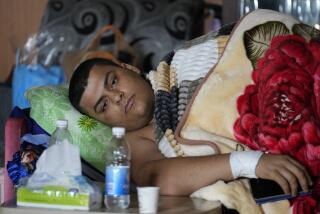Baghdad car bombing leaves at least 51 dead
- Share via
BAGHDAD — A car bomb exploded Tuesday on a bustling commercial street in west Baghdad’s Shiite neighborhood of Hurriya, killing at least 51 people and wounding 75, security officials said.
The blast, which occurred about 5:45 p.m., devastated a shopping area and bus stop where residents had waited for minibus taxis and vendors had sold falafel, burgers and juices. Rescuers lifted out the wounded and dead, while relatives searched for loved ones. It was the deadliest such attack in Baghdad since March.
A 14-year-old girl, dressed in a black headdress and robe, towed a boy by the hand and searched for her father.
“Where are they going to take the injured?” the weeping girl asked other distraught pedestrians.
Bombs explode regularly in the Iraqi capital, but death tolls seldom reach double digit figures these days. A pair of suicide bombings in February at pet markets in Shiite sections of Baghdad killed 99 people, and a double bombing in the city’s Karada district killed 68 a month later.
After the explosion Tuesday, flames swallowed a pair of power generators and shot up a three-story building, trapping people inside and spewing a sheet of black smoke. The people climbed to the roof and ran across nearby rooftops to escape the fire.
On the ground, a woman’s charred body lay in a car while volunteers carried the wounded and dead from the scene.
Some residents shaken by the blast blamed the government for weakening Shiite cleric Muqtada Sadr’s Mahdi Army militia. The neighborhood, once mixed, became largely Shiite during fall of 2006, when the capital was ripped by civil war. Many of Sadr’s followers live there.
Sadr’s fighters carried out many reprisal attacks against Sunnis at the height of Iraq’s sectarian conflict, when car bombs exploded regularly in Shiite neighborhoods, killing dozens. However, the movement now has strained relations with Prime Minister Nouri Maliki, whom it criticizes for cooperating with the Americans and collaborating with its own political rival, the Supreme Islamic Iraqi Council.
One man in his 20s said, “If the Mahdi Army was controlling Hurriya such things would never happen. Our government can’t be trusted.”
Sectarian tensions flared as some in the crowd made accusations against Sunni politician Adnan Dulaimi, who lives in the adjoining neighborhood of Adil. Dulaimi’s guards once were arrested in connection with car bombs found in his compound. Some say gunmen linked to Dulaimi drove Shiites out of Adil.
“Adnan Dulaimi did it before and will do it again because the Mahdi Army is on the run,” said a man named Saif. “If Maliki wants to be just and bring the peace back, let him detain the devil Adnan.”
Elements of the Mahdi Army have been involved in attacks against Iraqi security forces in recent months, but the bombing had the hallmarks of Sunni extremists seeking to ignite Shiite tempers, which could provoke retaliation.
Sadr’s efforts to freeze his militia and the alliance of many former Sunni insurgents with the Americans have warded off a return to the tit-for-tat bloodshed of recent years.
The Hurriya explosion came hours after a suicide bomber rode a motorcycle into a checkpoint on the periphery of the Sunni district of Adhamiya in east Baghdad, killing four fighters with the Sons of Iraq, a group allied with the Americans against Sunni militants, security officials said.
The insurgent group Al Qaeda in Iraq has launched repeated attacks against the Sunni paramilitary groups in Baghdad.
A buildup of U.S. troops last year, the emergence of the paramilitary groups and the decision to seal off many neighborhoods and markets with concrete barriers have drastically reduced Baghdad’s strife. American officials describe the progress as fragile.
The number of attacks in Iraq dropped last month to its lowest level since March 2004. The U.S. military is in the process of drawing down from a high of 168,000 troops last summer to 140,000 by the end of July. If Iraq remains stable, the military expects further reductions in the fall.
In other developments, gunmen in the northern city of Mosul killed state television journalist Muhiydin Abdul Hameed as he left his house, police said.
Despite a campaign this spring against Al Qaeda in Iraq, there have been high profile killings of lawyers, teachers and doctors in Mosul. Tensions also continue to simmer in the north between Kurds and Arabs as they maneuver for ownership of disputed lands.
In the western province of Anbar, U.S. military officers said responsibility for the area would be transferred to the Iraqi government next week. The move will cap a remarkable turnaround in the province, which was once the haven of Sunni insurgents. Now former insurgent fighters provide much of the security in Anbar and rely on Americans for support.
In Baghdad, the parliament announced that it would move from the Green Zone, which houses the U.S. Embassy and most Iraqi government offices, to the Saddam Hussein-era parliament building in the Allawi neighborhood. The move is expected to be completed in time for the next legislative term, which is scheduled to begin in September.
--
Times staff writers Saif Hameed, Caesar Ahmed and a special correspondent in Mosul contributed to this report.
More to Read
Sign up for Essential California
The most important California stories and recommendations in your inbox every morning.
You may occasionally receive promotional content from the Los Angeles Times.













